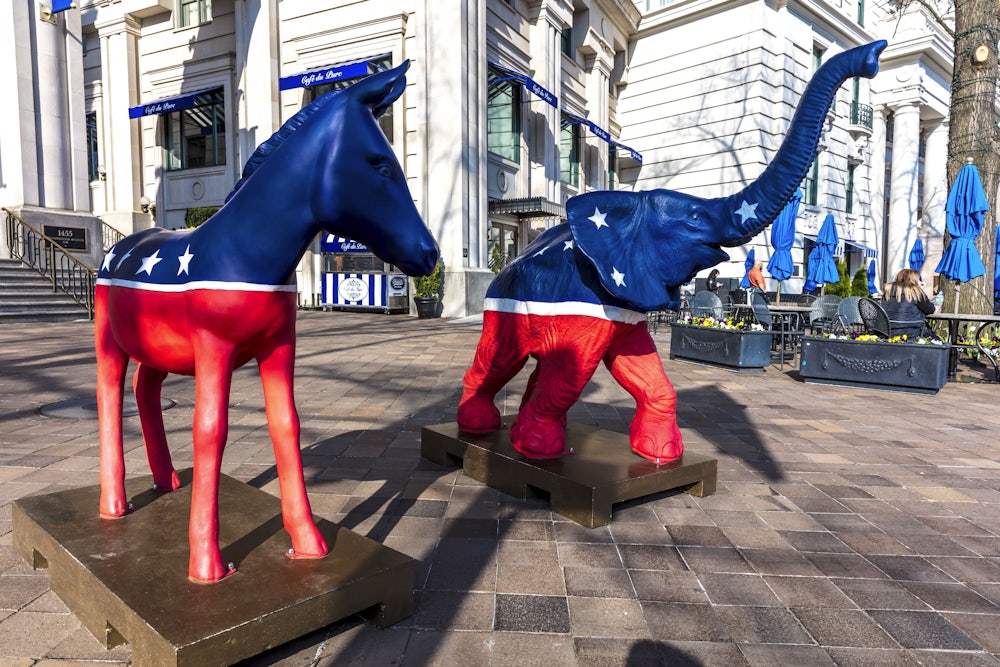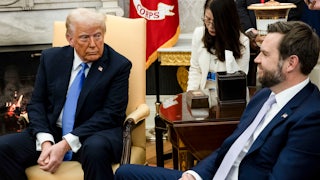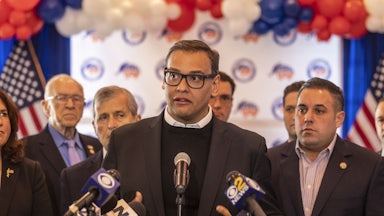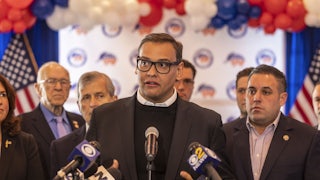The team had no idea their generic ballot forecast would debut on cable news last Monday.
“We were gobsmacked,” said Lakshya Jain, 25, one the four partners in Split Ticket, a new elections forecasting outlet that hopes to disrupt the beat during the midterms with a novel analytical approach to its widely cited articles (in the Financial Times, AP, Slate, etc).
The debut came when MSNBC host Joy Ann Reid ran a graphic for just over five seconds featuring the team’s generic ballots average alongside those of FiveThirtyEight and RealClearPolitics.
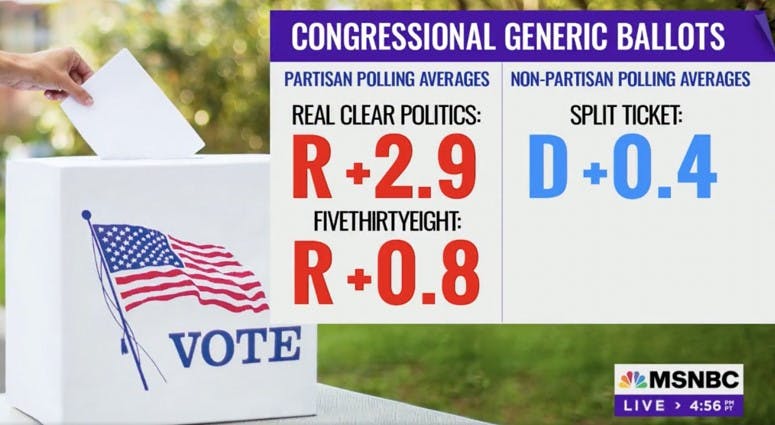
Reid slammed the established outlets as untrustworthy. “You can’t just look at them as, ‘Well, I can trust them because it’s FiveThirtyEight and RealClearPolitics’ because there’s a lot of junk polls in them,” said Reid, a comment that made the Split Ticket team bristle.
“I wish she didn’t list FiveThirtyEight as a partisan pollster,” said Jain of the competitor outlet founded by elections forecasting legend Nate Silver.
“They use partisan polls. That doesn’t make them a partisan thing,” agreed Clare Considine, 27, Jain’s partner in Split Ticket along with Harrison Levelle and Armin Thomas.
The New Republic caught up with the four publishing partners last Wednesday on Zoom, where they spoke on the record for the first time about who they are, what they do, and how Split Ticket has become a new-generation voice in elections forecasting.
When Donald Trump defied predictions to win the presidency in 2016, a crisis of credibility hit the small but influential world of election forecasters. “They wrote article after article about how Donald Trump had no chance,” recalls Lakshya Jain, 25, a machine learning engineer who was in high school at the time. “Then, come election night, it was the biggest shock to all of America.”
“We don’t want to end up in a place where people did in 2016,” said Jain who, along with Lavelle and Thomas, launched Split Ticket in November 2021. Considine, the team’s only professional pollster, joined in September, after Jain recruited her for her knowledge of the “day to day machinations” of election campaigns that forecasters often miss, “like a shitty ground game” or a candidate’s cash flow.
“Harrison is our token white guy,” joked Considine, 27, a progressive campaign operative who is registered as a Republican in her home state of Louisiana. “For strategy reasons,” she laughed, “so I can get the mailers.”
Lavelle told The New Republic that the idea for Split Ticket came when he and Thomas worked on projects together for Inside Elections, a nonpartisan newsletter by Nathan Gonzales. “We decided we wanted to leverage that experience to do something new,” said Thomas.
When Jain found out what Lavelle and Thomas were planning, he offered to help. The San Francisco–based engineer and elections nerd made news in January 2021 when he created an election model that hyperaccurately predicted the outcome of the Georgia Senate runoffs that sent Jon Ossoff and Raphael Warnock to Capitol Hill and gave Democrats a unified majority in Congress.
“The Washington Post was reporting that barring a Democratic miracle in Georgia, it seems exceedingly unlikely Democrats will pass anything because there’ll be a Republican Senate,” Jain recalled. “But anyone watching the runoff data who knew how to model it would have told you it’s actually Democratic leaning from the start because [of] the way coalitions had changed. I kept reading that over and over and got frustrated.”
Lavelle echoed Jain’s frustrations with the pollster groupthink they say can be pervasive on their election beat. “Many forecasting outlets are echo chambers, and they don’t explore every possible outcome,” said Lavelle, 19, a political science student at the College of New Jersey and the youngest of the Split Ticket team.
Thomas agreed. “I think that a lot of forecasters might not be explicitly partisan, but generally they tend to follow each other and have kind of a herd mentality,” said the 23-year-old, who has a day job in financial services.
Split Ticket distinguishes itself from other election-forecasting outlets through what Lavelle calls “the general nonpartisan basis” upon which the outlet was founded. The team rigorously works to scrub poll data paid for by Democrats, Republicans, and other political partisans from its analyses.
Instead, Jain said that Split Ticket seeks to aggregate election data “from the people who have no affiliations, no stake in the game whatsoever,” like polls funded by media, academia, and other nonpartisan groups.
“We’re a nonpartisan outlet,” said Thomas, adding that the editing process that each Split Ticket article goes through involves a conscious attempt by the team to strip any partisan language or perspectives from its final work products.
The group talks about its predecessors with the mix of pugnaciousness and politeness that only youth has. “Even FiveThirtyEight is not, unfortunately, immune from asymmetric influences on an aggregator,” said Jain—who quickly added that Nate Silver has the best generic ballot tracker in elections forecasting.
Silver and producer Galen Druke discussed at length a Split Ticket article by Jain on a recent episode of the FiveThirtyEight podcast.
“The Split Ticket article is good,” said Silver, after describing how Jain had concluded that polling firm Trafalgar Group, which services GOP campaigns, was clumsily overcompensating for Republicans in its data.
“Clearly Trafalgar is not doing anything resembling a traditional approach … and so therefore are kind of, like, winging it,” said Silver on the pod.
Humility is a key to Split Ticket’s success so far, said Lavelle, especially when making predictions. “When you have a prediction, there’s wide bands of uncertainty,” said Jain. “It’s good to know how we could be wrong and warn people about that.”
To this end, Split Ticket goes out of its way to include scenarios where its forecasts could go awry. “Being right is nice,” said Thomas. “We would like to be right in all cases. When we’re not right, we try to be wrong in the right way.”
As Split Ticket’s brand and community continues to grow, the young elections geeks say they are taking their rising stock in political media one day at a time.
“We’re doing a livestream on election night where the vibe will be different from [MSNBC national political correspondent Steve] Kornacki with his big board or people doing some highly structured, highly choreographed Twitter space,” said Considine.
“We want the audience to feel like they’re hanging out with their friends on election night because, in a way, they are,” she added.
